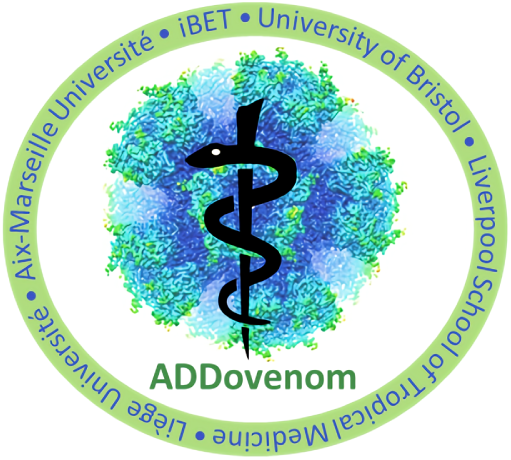Partners
Research Institutes
The ADDovenom project is part of and is administered by the Bristol BioDesign Institute. Work on ADDovenom will be undertaken in the School of Biochemistry which is particularly strong in Synthetic Biology with the BrisSynBio Centre, Structural Biology, Imaging, Single-Molecule Techniques and Cell Biology. The School offers access to top facilities, including the Faculty’s Wolfson Bioimaging and Proteomics Facilities, and the BrisSynBio Biosuite located in the school, as well as crossdisciplinary training of early career researchers. The School has been awarded with the Athena SWAN Silver Award (2018) for excellence in gender equality in STEMM (Science, Technology, Engineering, Mathematics and Medicine). The work described here will take place in the new Max Planck Centre for Minimal Biology in Bristol, which is directed by Berger, Mann and Wolfson and is world class in Synthetic Biology. The University of Bristol will express, purify and characterise ADDobodies and ADDomers, generate a naïve ADDobody library, carry out in vitro selection/evolution by Ribosome Display, provide sample for in cellulo and in vivo characterisation, constructs for manufacturing antivenoms and determine structures.
ULiege will be in charge of analysing the venoms and sequencing their toxins by various proteomics approaches. The MS-Lab has a long-standing experience of such development, especially due to its position of work-package leader for proteomics in the European Project ‘Venomics’ (FP7- HEATH 2011-2015). Within the Venomics program, 200 venoms have been characterised to identify peptide content and, combined to their respective transcriptomes, which led to the generation of a databank of more than 20,000 toxin sequences. In this project, the objective will be different and more challenging because ADDovenom does not necessarily aim at sequencing the smallest, most abundant and easily detected toxins, but the most toxic, whatever their size or their abundancy in the venom.
The AMU-AFMB protein expression core facilities will oversee the expression and purification of most of the toxins, epitope strings, ADDobodies and ADDomers of the project. Purified proteins and complexes will be characterised biochemically and biophysically on the “AMU-AFMB biophysics core facility” by several methods including ELISA, surface plasmon resonance (SPR), Thermophoresis, SECMALS and thermal shift assays.
Main tasks in the project involve provision of venoms and venom gland transcriptomes for eight snakes, basic “serology” of ADDomer recognition of toxin components, determination of the ability of ADDomers and ADDobodies to in vitro neutralise the function of each class of toxins and comprehensive pre-clinical in vivo testing of the best ADDomer candidates in murine models of venom lethality. LSTM will perform pharmacokinetic characterizations of ADDomers in rodent models and examination of toxicity of ADDomers in a rodent model. LSTM will advocate for the next phase of ADDovenom research – clinical trial preparedness in subSaharan Africa.
iBET has successfully developed production and purification processes of complex and functionalized biopharmaceuticals as well as analytics and systems biology tools for virus-based bioprocesses. This knowledge will be used in ADDovenom for process development for ADDomers production: (i) implementation of supporting analytical methods; (ii) upstream and downstream process development; (iii) production of ADDomers.

